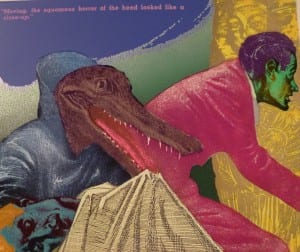Reflections on the Printing Techniques Workshop
By ucwchrc, on 6 June 2014
Slade students, artists and curious print-making novices both from within and outside of UCL got together for a Pop Up lunch-time talk by artist and UCL Art Museum Curatorial Assistant, Ling Chiu on 27th May in the UCL Art Museum. When she is not at the Museum, Ling works at a printmaking studio in southeast London, helping artists such as Ray Richardson and Peter Blake to create prints in screenprint, etching and lithography.
Ling introduced us to fine art printing techniques, referring to the UCL Art Museum’s extensive collection of prints as inspirational examples. We were encouraged to look at a diverse selection before the workshop started, and then to reflect on them again after we had learnt about some of the printing techniques. This produced different engagements with the work, and was a fun way of relating techniques back to the art objects. The most popular print Ling displayed from the collection was Jack Miller’s ‘Weird Tales’ (UCL Art Museum 9239), which had a textured, velvet effect produced by combining flocking with screenprint techniques (think Andy Warhol meets 18th century floral wallpaper!).
The workshop followed on from an earlier session Ling had taken at the UCL Art Museum that looked at traditional printing methods typically used before 1850. This included relief printing (where the ink sits on top of the printing surface, and by which woodcuts and linocuts are made), intaglio printing (where the ink sits inside the printing plate, and is used to produce etchings and dry points), and planograph printing (which involves a chemical rather than physical change, and is used for lithography and screen-printing). With planographs, Ling used examples of her own work and some from the UCL Art Museum collection to describe how you work directly on the surface of the printing plate. You are also able to work on a large scale and in lots of colour as this is a painterly method of printing. However, each colour is drawn on a different stone, making the process relatively complex. One of Ling’s examples, Ludwig Grüner’s Sistine Chapel (UCL Art Museum 2872), took about 11 stones to achieve the subtle and extensive range of colours! (more…)
 Close
Close


